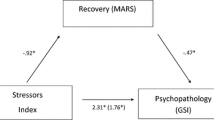Abstract
Peer recovery specialists are an important resource in community mental health settings. This study, which was part of a larger statewide assessment, evaluates how the role impacts work and personal lives of peers, with implications for improving the training and supervision of this service. The importance of peer work has been investigated through client outcomes, however less work has investigated outcomes on peers themselves, which impacts the work force and service delivery. Nine focus groups were conducted with peer recovery specialists. A two-stage qualitative analysis led to two overarching themes, work and personal, and six subthemes. Findings suggest being a peer presents unique benefits and challenges in work and personal life. Peers benefit from more training and supervision, consistency within the role, and maintaining boundaries. Additionally, work environment roles may be improved by attention to needs of supervisors in terms of skills for effective supervision and clarification of supervisory roles.
Similar content being viewed by others
References
Acton, G. J., & Malathum, P. (2000). Basic need status and health-promoting self-care behavior in adults. Western Journal of Nursing Research, 22(7), 796–811. https://doi.org/10.1177/01939450022044764
Ahmed, A. O., Hunter, K. M., Mabe, A. P., Tucker, S. J., & Buckley, P. F. (2015). The professional experiences of peer specialists in the Georgia mental health consumer network. Community Mental Health Journal, 51(4), 424–436. https://doi.org/10.1007/s10597-015-9854-8
Boddy, C. R. (2016). Sample size for qualitative research. Qualitative Market Research, 19(4), 426–432. https://doi.org/10.1108/QMR-06-2016-0053
Bassuk, E. L., Hanson, J., Greene, R. N., Richard, M. R., & Laudet, A. (2016). Peer-delivered recovery support services for addictions in the United States: A systematic review. Journal of Substance Abuse Treatment, 63, 1–9. https://doi.org/10.1016/j.jsat.2016.01.003
Creswell, J. W. & Poth, C. N. (2018). Qualitative inquiry and research design: Choosing among the five traditions (4th ed., International student edition). Sage.
Daniels, A. S., Bergeson, S., Fricks, L., Ashenden, P., & Powell, I. (2012). Pillars of peer support: advancing the role of peer support specialists in promoting recovery. The Journal of Mental Health Training, Education, and Practice, 7(2), 60–69. https://doi.org/10.1108/17556221211236457
Davidson, L., Chinman, M., Kloos, B., Weingarten, R., Stayner, D., & Tebes, J. K. (1999). Peer support among individuals with server mental illness: A review of the evidence. Clinical Psychology: Science and Practice, 6(2), 165–187. https://doi.org/10.1093/clipsy.6.2.165
Foster, K., Roche, M., Delgado, C., Cuzzillo, C., Giandinoto, J., & Furness, T. (2019). Resilience and mental health nursing: An integrative review of international literature. International Journal of Mental Health Nursing, 28(1), 71–85. https://doi.org/10.1111/imm.12548
Klee, A., Chinman, M., & Kearney, L. (2019). Peer specialists services: New frontiers and new roles. Psychological Services, 16(3), 353–359. https://doi.org/10.1037//ser0000332
Kuhn, W., Bellinger, J., Steven-Manser, S., & Kaufmann, L. (2015). Integration of peer specialists working in mental health service settings. Community Mental Health Journal, 51(4), 453–458. https://doi.org/10.1007/s10597-015-9841-0
Lincoln, Y. S., & Guba, E. G. (2007). But is it rigorous? Trustworthiness and authenticity in naturalistic evaluation. New Directions for Evaluation, 114, 15–25.
Moran, G. S., Russinova, Z., Gidugu, V., Yim, J. Y., & Sprague, C. (2012). Benefits and mechanisms of recovery among peer providers with psychiatric illnesses. Qualitative Health Research, 22(3), 304–319. https://doi.org/10.1177/1049732311420578
Morrow, S. L. (2005). Quality and trustworthiness in qualitative research in counseling psychology. Journal of counseling psychology, 52(2), 250–260. https://doi.org/10.1037/0022-0167.52.2.250
Patton, M. Q. (1990). Qualitative evaluation and research methods (2nd ed.). Sage.
Ray, S. L., Wong, C., White, D., & Heaslip, K. (2013). Compassion satisfaction, compassion fatigue, work life conditions, and burnout among frontline mental health care professionals. Traumatology, 19(4), 255–267. https://doi.org/10.1177/1534765612471144
Rossler, M. (2012). Stress, burnout, and job dissatisfaction in mental health workers. European Archives of Psychiatry and Clinical Neuroscience, 262(2), 65–69. https://doi.org/10.1007/s00406-012-0353-4
Roy, A.A., Lund, E., Tate, M.C., Fox, J., Saint-Laurent, S., Cottrill, S.D., & Stein, L.A.R. (2020). Program Evaluation of the Rhode Island Certified Peer Recovery Specialist Model for Workforce Development: A Report Commissioned by The Department of Behavioral Health, Developmental Disabilities and Hospitals. Created under a Memoranda of Understanding between the Dept. of Behavioral Healthcare, Developmental Disabilities & Hospitals and The University of Rhode Island, Directors M. Brophy of BHDDH and L.A.R. Stein of URI, with funding from the RI Executive Office of Health & Human Services (“Inter-Professional Workforce Development” grant), Principal Investigator-Stein, Project Director-S. Cottrill. (in preparation to be submitted to BHDDH as a White Paper).
Salzer, M. S., Darr, N., Calhoun, G., Boyer, W., Loss, R. E., Goessel, J., Schwenk, E., & Brusilovskiy, E. (2013). Benefits of working as a certified peer recovery specialist: Results from a statewide survey. Psychiatric Rehabilitation Journal, 36(3), 219–221. https://doi.org/10.1037/prj0000016
Soloman, P. (2004). Peer support/ peer provided services underlying processes benefit, and critical ingredients. Psychiatric Rehabilitation Journal, 27(4), 392–401. Retrieved from: http://citeseerx.ist.psu.edu/viewdoc/download?doi=10.1.1.520.62&rep=rep1&type=pdf
Stewart, D. W., Shamdasani, P. N., & Rook, D. W. (Eds.) (2007). Focus groups: Theory and practice (2nd ed). Sage.
Volpe, U., Luciano, M., Palumbo, C., Sampogna, G., Del Vecchio, V., & Fiorillo, A. (2014). Risk of burnout among early career mental health professionals. Journal of Psychiatric and Mental Health Nursing, 12(9), 774–781. https://doi.org/10.1111/jpm.12137
Funding
This study was funded by RI Executive Office of Health & Human Services (Grant No. RI-EOHHS-3509167).
Author information
Authors and Affiliations
Corresponding author
Additional information
Publisher's Note
Springer Nature remains neutral with regard to jurisdictional claims in published maps and institutional affiliations.
Rights and permissions
About this article
Cite this article
Tate, M.C., Roy, A., Pinchinat, M. et al. Impact of Being a Peer Recovery Specialist on Work and Personal Life: Implications for Training and Supervision. Community Ment Health J 58, 193–204 (2022). https://doi.org/10.1007/s10597-021-00811-y
Received:
Accepted:
Published:
Issue Date:
DOI: https://doi.org/10.1007/s10597-021-00811-y




